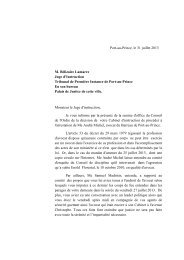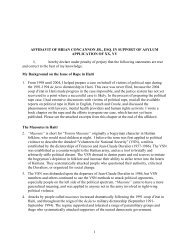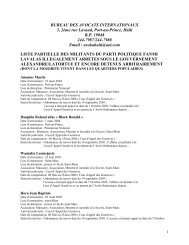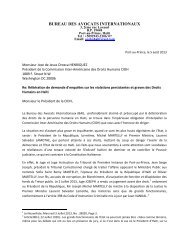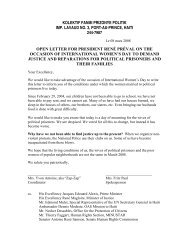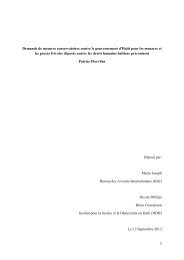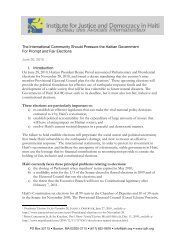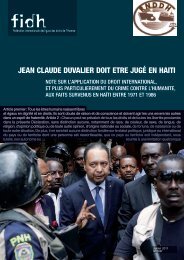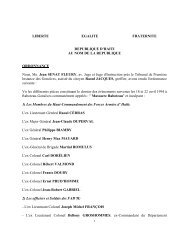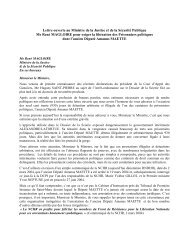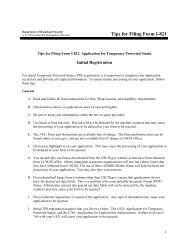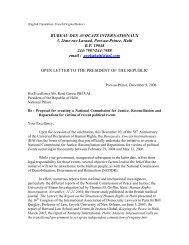Peacekeeping without Accountability - Yale Law School
Peacekeeping without Accountability - Yale Law School
Peacekeeping without Accountability - Yale Law School
- No tags were found...
Create successful ePaper yourself
Turn your PDF publications into a flip-book with our unique Google optimized e-Paper software.
2010July 28–August 14 A 1,400-case outbreak of cholera occurs in mid-western region of Nepal.October 8–21October 12October 14–19October 19October 21–23October 23Late OctoberEarly NovemberNovember 19MINUSTAH troops arrive in Haiti after a 10-day leave visiting their families in Nepal.A 28-year-old man from the town of Mirebalais, located downstream from the MéyèMINUSTAH Base, is the first cholera patient of the 2010 epidemic. This man suffers from apsychiatric condition and regularly drank untreated water from a stream fed by the MéyèTributary. The man develops profuse watery diarrhea. Less than a day after the onset ofsymptoms, he dies <strong>without</strong> medical attention. The man is not diagnosed with V. choleraethrough laboratory methods.Outbreak investigations also identify several families living in Méyè as the firsthospitalized cholera patients. These individuals exhibit cholera symptoms. Stool samplesfrom a subset of these patients test positive for V. cholerae.Haitian health officials report unusually high numbers of patients with watery diarrheaand dehydration in two of Haiti’s ten administrative departments.Additional cases of cholera are reported among the inhabitants of Mirebalais.National Public Health Laboratory (LNSP) confirms presence of V. cholerae.Haitian officials report an explosion of cases across the Artibonite River Delta.Cholera has spread to cities across the Haitian North-West and North Departments,which are roughly equidistant from the Artibonite Delta.The Haitian Ministry of Health (MSPP) reports positive cholera cases in all ten Haitianadministrative departments.The transmission of a waterborne disease likecholera across geographical regions takes aslong as it would take for the water to travel thesame distance. An Independent Panel of Experts,appointed by the U.N. to investigate the originsof the epidemic, calculated that it would take twoto eight hours for water in the Méyè Tributaryto flow from near the MINUSTAH camp’s wastefacilities to its junction with the ArtiboniteRiver. 119 The U.N. Independent Panel of Expertsalso found that a contamination of the Artibonitestarting at the Méyè Tributary would be fullydispersed throughout the Artibonite River Deltawithin a maximum of two to three days. Thistimeline, the panel noted, was “consistent withthe epidemiological evidence” showing that theoutbreak began in Mirebalais, near the MéyèTributary, and that cases of patients experiencingcholera-like symptoms appeared in the ArtiboniteRiver Delta area two to three days after thefirst cases of cholera were seen upstream inMirebalais. 120C. The Troops at the MINUSTAH Base WereExposed to Cholera in Nepal, and TheirFeces Contaminated the Water SupplyNear the Base.Epidemiological studies report that the U.N.peacekeeping troops that arrived in Méyè justbefore the Haitian cholera outbreak had beenexposed to the disease in Nepal shortly before theirdeparture to Haiti. Poor sanitation infrastructureat the MINUSTAH camp in Méyè led to fecalcontamination of the water supply near the campand near the site of the first cases of cholera inHaiti. Locals regularly used this water for drinking,cooking, and bathing.Nepalese peacekeeping troops arriving at theMINUSTAH camp in Méyè between October 8–24had been exposed to cholera in Nepal. Cholera isendemic to Nepal and the country experiencessporadic outbreaks every year. In 2010, a 1,400-case outbreak occurred in the country, beginningaround July 28 and lasting until mid-August,just prior to the Nepalese troops’ deploymentto Haiti. 121 During this outbreak, MINUSTAH21scientific investigations identify minustah troops as the source of the cholera epidemic



